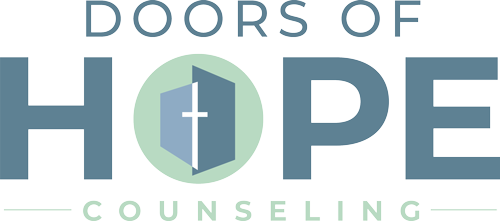Here at Doors of Hope we believe in using and being knowledgeable on the most up to date information about mental health. This is one reason we use acceptance and commitment therapy (ACT). Acceptance and Commitment Therapy is one of the most modern theories available to clinicians when it comes to many mental health disorders. We believe it provides a unique, more effective perspective on problems than most other theories out there. Not only is it statistically proven effective, we have also witnessed it tremendously help hundreds of people who have come to us for help.
Because ACT is so different (and therefore more effective), the concepts of the theory can feel very foreign. The skills take practice and are not intuitive (intuition gets people in our offices 😜) so we hope this overview will provide you with a foundational understanding of ACT before your first session with on of our ACT therapists. Your sessions will build on this very basic understanding as well as provide you the skills to apply this theory to your problems.
Acceptance and Commitment Therapy is based on the idea that people present to therapy handling their problem in a couple unhelpful ways. One is that people tend to try to control their problems. With anxiety for example this often looks like overthinking, overpreparing, reactive behaviors, and much more. Two, people often try to avoid their problems. With the diagnosis of anxiety for example, this often looks like sleeping, eating, drug and alcohol use, avoiding social situations and self care, or opting out of opportunities. The list goes on and on. ACT gives us the tools to relate to our problems differently. In other words, it helps us be psychologically flexible. Rather than changing the problem (which we often can’t control), ACT helps us change the way we interact with the problem. There are a few core concepts (bolded) and steps (underlined) that help us do this. Keep in mind that this theory is most effective when you apply all the concepts to the problem simultaneously!
- Awareness and self as observer (some people call this self as context)- self as observer is a good place to start because we have to be aware of the symptoms and problem before we try to do anything differently about it. When noticing our symptoms we want to do that in a way that separates ourself from the symptoms. So we become an observer to our internal experiences. This makes us less judgmental and more objective about them. So this turns “I’m so anxious” into “I’m noticing some tightness in my chest”. Even just changing the way we acknowledge the symptom, changes the power it has over us.
- Unhooking– if you have a mental health disorder, you know it can pull you in directions you don’t really want to go (thinking things you don’t want to think, feeling things you try desperately not to feel, going in life directions you don’t really believe in, etc) but you feel out of control of it. This means you have been hooked by the problem and it’s very common. These next skills that you will be taught help the most with this (though all of the concepts help to unhook).
- Defusion– defusion refers mainly to thoughts and thinking patterns we have. Thoughts are like lemons, they only have so much juice we can get out of them. We want to help you get to a place where you don’t feel enslaved by your thoughts but instead you can watch them come and go like passing cars, gaining what you can and leaving the rest. Thoughts are our brains way of making sense of the world but they dont usually represent truth. We want to learn to distance ourself from our thoughts enough so that we stop wasting time and energy trying to figure out whether they are true or false. Instead, we want to focus on what’s helpful. For example the thought “I’m fat” itself is not helpful. It’s not moving you toward a healthy lifestyle or giving you more self compassion. Defusion techniques will help take the power away from that thought without trying to change it (because you’ll learn that we don’t have control over our thoughts and when we try to change them sometimes they get worse!).
- Acceptance– Here at DOH you will also learn acceptance techniques for your feelings. Though society tells us otherwise, our feelings are actually not at all in our control. So rather than trying to control them (which actually gives us less control over them!) or avoid them, we will teach you acceptance techniques so you can learn to take your feelings with you on your purpose driven life journey. In the long run, this will naturally decrease unwanted feelings but this is not the primary goal.
- Act on values– finally, once you learn to unhook from your feelings you will have more energy to put towards what is actually important to you.
- Clarifying values– we will help you clarify what’s important to you because most people who have been suffering are simply in survival mode. Enough time there and naturally you start to forget what really matters.
- Committed action– once you know your valued life direction we help you set goals and find ways to commit to those values. Some committed actions are also considered exposures. Exposures are specific actions that create discomfort for you in the short term, but in the long run, when used in conjunction with other ACT skills, it will help reduce anxiety. Exposures and committed actions will be unique to your values and problems and your therapist will work on this with you.
- Attention to the present– In doing any of these skills we want you to focus on the here and now but especially during valued living. Our mind is like a broken time machine and likes to pull us into the past (regrets and depression) or future (what ifs, anxiety) but these areas are not in our control. So we always have to be able to come back to the present where it’s helpful. We will teach you mindfulness skills to help you build this “muscle”.
In sum, ACT helps us to accept the things we can’t change (thoughts, feelings, other people, past, future, etc.) and commit to changing the things we can (our actions).
So this is ACT in a nutshell! You are probably confused and overwhelmed right now. First, remember that this is probably your anxiety talking. Also know that what you feel is absolutely normal and this is just a brief overview. You are in a perfect place to start this journey and we are excited to help you! If you want more information NOW, the Happiness Trap by Russ Harris is a great book that expands on all this as well. We can’t wait to meet and work with you!

